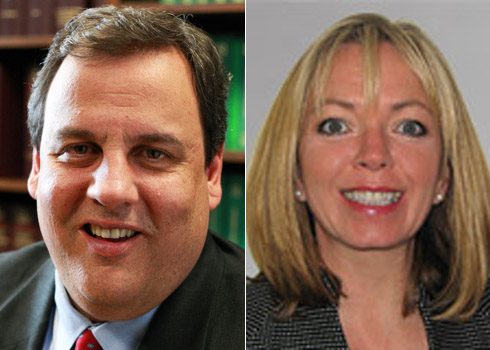Back in August, when it was revealed that Chris Christie had given an unreported $46,000 loan to Michele Brown, his top deputy at the US attorney’s office, we had a sense there was more to the story than we’d yet learned.
And today’s revelations from the New York Times help fill out the picture. Simply put, a close look at the unusually close relationship between the two — as well as at other evidence that Christie retains ties to his former colleagues in the prosecutors’ office — strongly suggests that in the service of his bid for governor, he may have improperly politicized an office that’s supposed to be an independent administrator of justice.
Let’s look at a time-line of relevant events:
⢠2002: Christie takes over the office as US attorney.
⢠2003: Christie promotes Brown, who has been a federal prosecutor since 1991, to counsel, the No. 4 position in the office.
⢠2007-08: Christie and Brown take 16 trips together on state business during Christie’s tenure as U.S. attorney, the bulk of them occurring during these two years, according to public records requested by the Corzine campaign and given to the New York Times. A junior prosecutor, Kevin O’Dowd, accompanied them on many of these. One such trip is to Las Vegas’s Venetian hotel and casino in Las Vegas last year, where Christie addresses a convention of medical device-makers — an industry his office had been probing.
⢠September 2007: Christie gives Brown a $46,000 mortgage loan. The plan was for her to repay it with monthly payments of $499 over 10 years.
⢠Early 2008: Christie promotes Brown again, giving her the additional title of executive assistant.
⢠December 2008: Christie resigns as US attorney to prepare to run for governor against Democratic incumbent Jon Corzine.
⢠Soon After: Brown is promoted to first assistant, the No. 2 job in the office.
⢠February 2009: Christie suggests that his former colleagues in the prosecutors’ office remain loyal to him, and that he’s talked to them about jobs in his administration should he be elected.
He tells a group of supporters:
I’ve got a group of assistant U.S. attorneys sitting down in Newark still doing their job. But let me tell you, they are watching the newspapers. And after we win this election, I’m going to take a whole group of them to Trenton with me and put them in every one of the departments.
⢠March 2009: Brown reportedly takes over responsibility from another staffer in the office for responding to a public records request from the Jon Corzine campaign. Among other things, the Corzine team had requested information on Christie and Brown’s travel records, and on Christie’s expenses.
⢠June 2009: Brown is alone in urging law enforcement colleagues to announce charges in a major New Jersey corruption bust by July 1. She reportedly told colleagues that she wanted to ensure that the bust occurred before Christie’s permanent replacement as U.S. attorney had been appointed — presumably in order to ensure that Christie got the credit.
⢠July 23: The corruption arrests are made. Despite not meeting the July 1 deadline, Christie — under whose tenure as U.S. attorney much of the investigative work took place — still appears to benefit, in part because the new U.S. attorney wouldn’t be appointed until October.
⢠August 2009: The AP reports that the Justice Department’s Office of Professional Responsibility is probing whether Marra made inappropriate politicized comments in announcing the corruption arrests. Asked about corruption at a press conference to announce the arrests, Marra said:
There are easily reforms that could be made within this state that would make our job easier, or even take some of the load off our job. There are too many people that profit off the system the way it is and so they have no incentive to change it. The few people that want to change it seem to get shouted down. So how long that cycle’s going to continue I just don’t know.
⢠August 2009: A New Jersey TV station reports on the undisclosed loan. Christie apologizes for his failure to disclose it, and characterizes it as simply a loan to a friend who was in financial need.
⢠Less Than Two Weeks Later: According to a New York Times source, DOJ brass tells Christie’s interim replacement, Ralph Marra, to remove Brown from her position coordinating the office’s response to the Corzine campaign’s FOIA request, because of the obvious conflict of interest. It’s that same day, says the source, that Brown abruptly resigns from the office, saying she does not want to become a distraction from the prosecutors’ work
⢠Soon After: Brown takes a job at a law firm with close ties to Christie. The firm had represented one of the companies identified as targets in Christie’s investigation of kickbacks among makers of medical devices. Brown had been the top prosecutor on the case, and she and Christie had negotiated a settlement in which the company paid a fine and avoided criminal charges.
This wouldn’t be the first time that Christie has been accused of politicizing the U.S. attorney’s office. In September 2006, his office leaked word that it was aggressively investigating Rep. Bob Menendez — the New Jersey Democrat who at the time was in a tight race for the Senate — over a rental deal. Control of the U.S. Senate hung in the balance, and the leak pleased national Republicans.
Menendez was never charged. Around the same period, Christie talked to Karl Rove about his plan to run for governor, according to Rove’s testimony to a Congressional panel probing the US attorney firings. So doing what he could to please Rove would have been a smart career move.
One non-partisan expert at the time told the New York Times: “I think you really do have to question the timing, particularly the subpoena of Menendez’s tenants. That strikes me as having very important political implications.”









